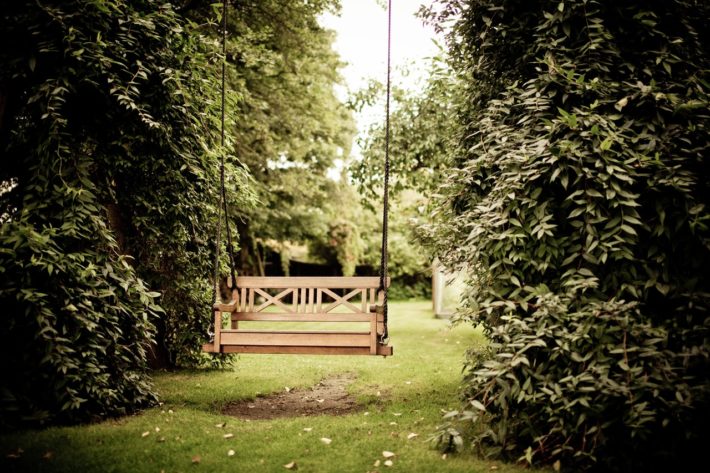
The Kingdom of God is a beautiful place — kind of like my backyard in the Upper Eno Watershed in North Carolina: lush, green, a riot of color where birds are singing happy songs and splashing in the bird bath. In this place, every living creature has enough. No one is poor or in need. There is abundance, not scarcity. This is a pipe dream, you might say, but this is the world God provides for us, only we do not cooperate because God’s world is a world where we are all downwardly mobile, dependent on God’s grace and provision and that just won’t do for us.
Maybe part of the reason we don’t trust God is because we often don’t believe that the Kingdom of God is here, now, on this earth at this time. Sadly, our reality is not the vision God has for God’s kingdom. I have learned that when I acknowledge that God is in the middle of all things, the way I live my life will almost always be countercultural.
The only way I can be sure that God will always be in the center of all that I do is to live a sabbath lifestyle. In his book, The Sabbath, Rabbi Abraham Heschel writes: “The Sabbath … is more than an armistice, more than an interlude; it is a profound conscious harmony of man and the world, a sympathy for all things and a participation in the spirit that unites what is below and what is above. All that is divine in the world is brought into union with God. This is Sabbath, and the true happiness of the universe.”
By adopting God’s definition of sabbath, all areas of my life have been affected, especially concerning what I do with our family’s money. — Lisa Bachman
Heschel’s words ring true, so, I have to ask myself, how do I keep God in the center by honoring the sabbath? How do I honor God and keep in harmony with God’s creation? There is no short answer to these questions. Over the last few years, by adopting God’s definition of sabbath, all areas of my life have been affected, especially concerning what I do with our family’s money. (Just a side note: My husband long ago turned over the responsibility of the finances to me. So far, honoring God with faithful stewardship and trusting God to provide for us has not bankrupted us). Of course, I am able to do all this because I am a person of privilege. Not everyone has the option to incorporate the following sabbath practices:
- Begin with prayer and study
- Pray in nature, hike in the woods (sans headphones), work in the community garden
- Ask myself: Am I working too much? Do I really need to do this now? Who else can help me with this task?
- Nix the bad habit of using Amazon (impulse buys, poor labor practices, little focus on sustainability)
- Remember that everything comes from God, practice radical generosity!
- Use less plastic and more reusable items.
- Evaluate purchases: Is it necessary? Where is it made? How much energy was used? Is it sustainable? Does the company have good labor practices?
- Invest in socially responsible companies
- Change from a traditional church where there was little desire to be the church in the world, to join a small, new faith community that is the church in the world.
Is this easy? Not at all! I am constantly under pressure to go back to my old ways. Eye-rolling in my family is an Olympic event, especially when I say that I am only buying organic food, grass-fed beef, bamboo toilet paper and that I will no longer buy bottled water (to name a few). I am constantly under pressure from ads (I do not watch TV but ads are everywhere!), friends urging me to buy this or that, family complaining about the price of sustainable items, yada yada yada. When I am tempted to cave to pressure, I try to remember that I believe in the “profound conscious harmony of man and the world,” and even though it is still hard to persevere, at least I know I am doing it for all the right reasons and I imagine that God smiles every time I make the right choice.
By Lisa Bachman | October 8, 2021
Lisa Bachman is a deaconess of The United Methodist Church and serves in the ministries of The Church at Spring Forest in Hillsborough, NC.